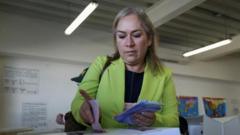The recent Italian referendum aimed at altering citizenship laws has been declared void due to insufficient voter participation, raising concerns among advocates and highlighting political divisions.
Italian Citizenship Referendum Fails to Meet Participation Threshold

Italian Citizenship Referendum Fails to Meet Participation Threshold
Low voter turnout renders recent referendum on citizenship reform invalid.
Italy's recent referendum on citizenship reform and workers' rights has been ruled invalid due to a disappointing turnout of around 30%, far below the necessary 50% threshold for the vote to be binding. Open between June 8 and June 9, the referendum included five distinct proposals, one of which sought to reduce the residency requirement for citizenship applications from ten years to five.
Organized by a citizens' initiative and backed by numerous civil society organizations and labor unions, the Yes campaign aspired to see significant reforms. However, the low turnout, which dipped to just 22% in regions like Sicily and Calabria, represents a considerable setback for these advocates.
Challenges in mobilizing voters were worsened by the current government, led by hard-right Prime Minister Giorgia Meloni, who notably ignored the referendum and even discouraged participation. In a notable display, Meloni declared her intention to boycott the vote, asserting that Italy's existing citizenship laws were already sufficiently progressive. Rather ironically, despite her visit to a polling place in Rome, she refrained from casting her own vote.
Political analysts expressed disappointment over the turnout, with Lorenzo Pregliasco, founder of polling firm YouTrend, noting that the numbers fell short of expectations. Moments after the polls closed, Meloni's Brothers of Italy party took to social media to proclaim victory over the opposing leaders, dismissing the push for reform.
Pina Picierno from the Democratic Party referred to the referendum as a "serious and avoidable defeat," further asserting that the failure to meet the turnout threshold represented a substantial boon for Meloni's administration.
To call a referendum in Italy, at least half a million signatures are needed, although there are ongoing discussions to raise this threshold to limit the frequency of public votes. Foreign Minister Antonio Tajani commented post-referendum, lamenting the financial resources expended on sending ballots abroad, which ultimately yielded wasted votes. Historically, only about half of Italy's 78 referendums since World War II have garnered enough participation for binding results.




















